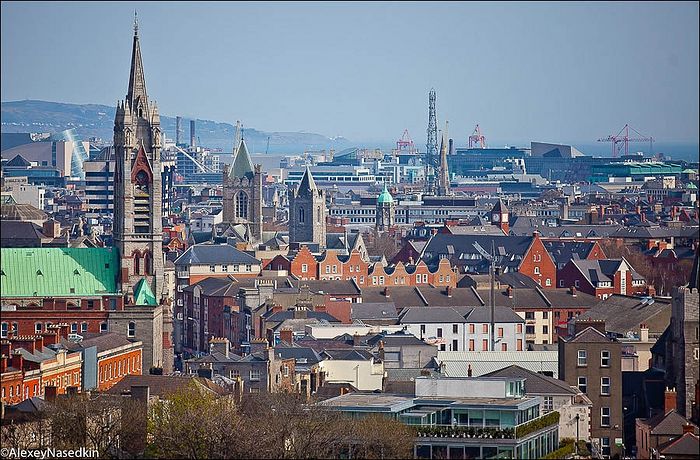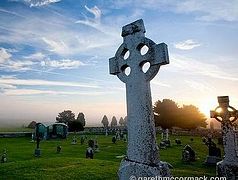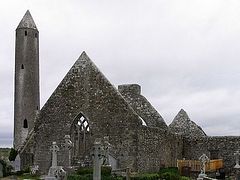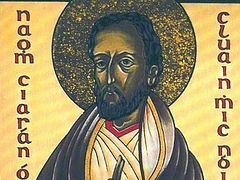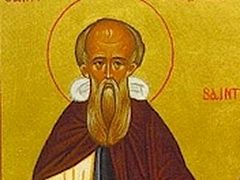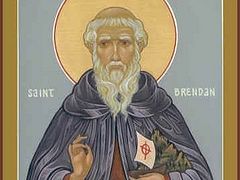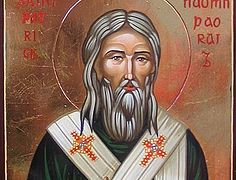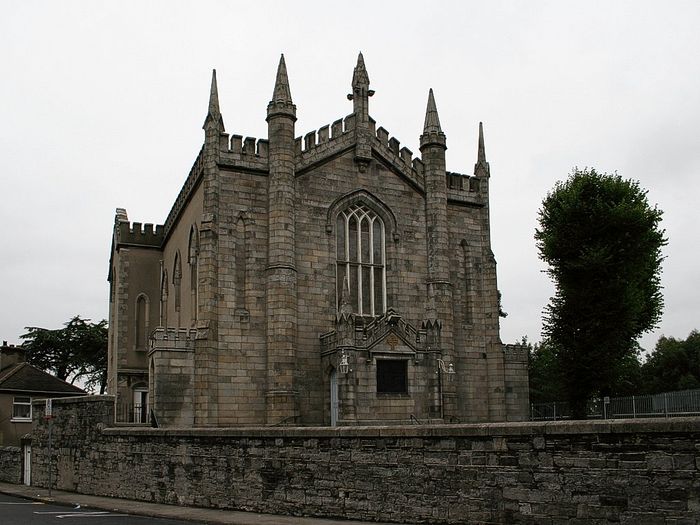 The Church of Sts. Peter and Paul in Dublin.
The Church of Sts. Peter and Paul in Dublin.
Ireland gives the impression of being a peaceful and blessed country, particularly to a traveler who sets foot on its soil for the first time. Smooth landscapes with green grass and grazing sheep bring back memories of the Britain I am familiar with and rather attached to. However, Ireland does not know the rush and bustle which sometimes sweep away English splendor like a whirlwind. The Irish land, enlightened and blessed by St. Patrick, produced hundreds of saints in the period when Rome still had unity with the Church of Christ.
Irish spirituality, which has not yet become extinct completely and has not yet been eradicated across the country, fills local residents with compassion and kindness, and helps them remain self-sacrificing and not indifferent to the problems of others. True, only fragments remain of the once-pious nation which is even more divided because of the spirit of secularism and the passage of anti-Christian laws, including the legalization of so-called “same-sex marriages”. But even under these circumstances the Good News of Christ is still being spread here, for the Orthodox faith exists in modern-day Ireland.
Orthodox presence in Ireland is gradually growing: according to the 2016 population census, 62,00 Orthodox Christians currently live in the country, which is thirty-seven per cent higher than in 2011. Now parishes of five Orthodox jurisdictions are active here: the Patriarchate of Constantinople, the Churches of Romania, Serbia, Antioch and the Patriarchate of Moscow. The Russian parishes are not numerous—there are only seven of them across the island, but a Russian Orthodox community acquired ownership of the Church of Sts. Peter and Paul at Harold’s Cross Road, Dublin. This parish was re-established in the early 2000s by Priest Michael (Mikhail) Gogolev from England. The church building was found by his efforts as well. At first the church was leased, and in 2013 it was purchased with the funds raised by the parishioners and with partial support of the Diocese of Sourozh.
The current rector of the St. Peter and St. Paul’s Church, Priest Michael Nasonov, has served in Dublin since 2011. Born in Sevastopol, he later graduated from the St. Petersburg School of Religion and Philosophy and the St. Sergius Theological Orthodox Institute in Paris. He was ordained a priest in March 2002. Fr. Michael worked as Vice-Rector of the Kostroma Theological Seminary and as a teacher at the St. Tikhon Orthodox University of Humanities in Moscow.
I took the opportunity to talk to Fr. Michael in Dublin during my short trip to Ireland.
On his first impressions after moving to Ireland
Moving to a foreign country, especially if it is separated from the mainland by seas and channels, always makes a strong impression on people. Something seems very strange and peculiar, some things seem commonplace to them, while other things really stagger them. The batiushka, for example, was disappointed that the Catholic Church in Ireland was under pressure.
“The Catholic Church is being under pressure from many sides,” Fr. Michael says. “The press either writes negative things about the Church or ignores it. The media keep spinning various Church-related scandals. All of this has negative effects and it particularly affects young people. I spoke to some young Irish residents whose view is that every Catholic clergyman is a terrible villain. Though there is one more factor. At one time the Catholic Church had a massive influence on life in Ireland and it sometimes went to extremes (in some regions a bishop was a more important figure than head of the local government). And it caused troubles from time to time. For example, there were cases of very severe punishments at schools and other incidents of this kind which alienated people of today’s older generation from the Church. Nevertheless, now the Catholic Church is one of very few institutions that are vigorously defending their stand on abortions and same-sex ‘marriages’.”
“Of course, we maintain working contacts with the Catholic Church, its bishops and clergy, in Dublin and in the regions alike. It is truly vital. For example, most of our parishes rent buildings of Catholic churches either for a token fee or free of charge,” Fr. Michael continues. “More than that, through Catholic chaplains it is easier for us to get access to prisons and hospitals in order to minister to the Orthodox there. Such chaplains serve in almost all Irish prisons and hospitals.”
Answering my question about his impressions after the beginning of his ministry in Dublin, batiushka explains that serving abroad is associated with the specifics of your parish and its differences from the parishes of other countries:
“On the one hand, parishes in Dublin, Moscow or Kostroma are all similar in many ways; but on the other hand, they are very different. Parishes abroad are different from Russian parishes by their national and social makeups. Yet parishes abroad differ as well. I remember parishes in France and they are not like those in Ireland. Even in the UK parishes are different. Our Dublin parish is unique because our parishioners began to go to church only after their arrival to Ireland. The social structure of our parish is specific as most of our parishioners are immigrants who moved here in the late 1990s. Unlike Paris or London, there are not many old immigrants in Dublin. There was a small group of Russians in Dublin, who came to Ireland following the Russian Civil War, as well as a group of Russian refugees from China, who left Harbin when the Communist Government of Harbin was established. On the initiative of Priest Nikolai Kuris, a native of the province of Odessa, a Russian parish was founded here which existed till 1977. Then, in the early 2000s, with the blessing of Metropolitan Anthony of Sourozh Priest Michael Gogolev came to Dublin and did much to build a church community here. Fr. Michael returned to England at the time of my arrival here, in 2011, to be precise. So I became the second priest of the Dublin parish after its rebirth.”
On the life of the parish and its parishioners
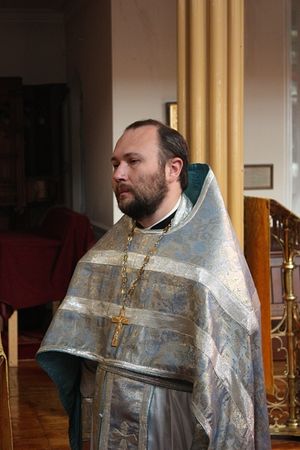 Rector of the Patriarchal Representation Church of the Holy Apostles Peter and Paul in Dublin Fr. Michael Nasonov. Photo by Karta.patriarchia.ru. Commenting on my words about possible problems in the Dublin parish, batiushka dwells on this subject, focusing his attention on parishioners—the core of every parish.
Rector of the Patriarchal Representation Church of the Holy Apostles Peter and Paul in Dublin Fr. Michael Nasonov. Photo by Karta.patriarchia.ru. Commenting on my words about possible problems in the Dublin parish, batiushka dwells on this subject, focusing his attention on parishioners—the core of every parish.
“People come to church with their problems. We ask God to solve our problems. People expect support, consolation and instruction from a priest. I suppose that the main problem (maybe that is true for all parishes) is the need to create an atmosphere of mutual aid and support, of one family, and fraternal love at a parish. Our parish has good parishioners who are responsive and not indifferent to the events around us. For instance, when the church was flooded during a terrible flood in 2011, people came here and helped repair the church, and among them were those who are not permanent church-goers.”
“Life in Ireland has two aspects for our parishioners,” Fr. Michael continues his story. “The country is small and it can be said that many Irish people are related to each other, which makes integration into Irish society very challenging (although the Irish are very friendly to newcomers). However, this creates a stress situation for newcomers; moreover, foreign employees in Ireland are dismissed first. Nevertheless, while adapting themselves to the Irish way of life, many immigrants ‘go into spiritual hibernation’, so to say. There is comfort here, and there are not such long distances and problems as in their native land. They simply ‘go into their shells’ and gradually spiritually decline. It would be better if our people roused themselves and got out of their shells.
“As for our parish in general, we have some problems with our facility; though we have heating, it is cold in the church. Although there are sufficient readers and acolytes, we have a shortage of choristers, especially men. We have few people with singing voices who are willing to sing. After all, our parish mainly consists of common people who are workers on construction sites. We also have some computer programmers, but have almost no ‘creative intellectuals’, so our situation is cannot be compared with that of London or Paris. And we are unable to invite anybody from Russia for lack of resources. Our parish can afford only one paid priest.”
--So the Patriarchate does not pay you?
--No, it doesn’t. Our community pays a modest monthly salary to its priest. The parish has sufficient money for supporting the priest and covering current expenses: heating, electricity and so on. All other Russian priests in Ireland have to have secular jobs, mostly as computer programmers. But I have more free time to travel across Ireland and visit all the parishes. When someone is dying or sick in the hospital, it is my duty to visit him. Of course, I am happy to have this opportunity.
Another problem is the lack of monasteries. There are no Orthodox monasteries in Ireland in our days.
--So no jurisdiction has a monastery or a convent?
--That’s right. Though a good monastery would be a great help for an Orthodox parish. But we are still unable to found a monastery. It’s not a matter of the right location. The problem is that we need to find an experienced monk who has lived at a monastery for some time. But all good monks are busy, while bad monks are needed by nobody. However, I believe that in due course everything will come off all right by the grace of God. We do have a parish with a large number of active men and a sort of a brotherhood. Perhaps one day a monastic community may come of it.
Our conversation turned to children. Batiushka himself takes care of three sons, and he has many parishioners with children. Thus his community is actively supporting an educational program for children.
--In our Sunday school courses are taught in three languages: Russian, English and Moldavian. I don’t think it’s a good idea to arrange the teaching process by taking an average secondary school as an example: cram, answers, grades, exams. I want the school to be a place where people can find new friends. Our task is not so much implementing the curriculum as creating a special atmosphere. We even have a drama school so that kids could prepare performances.
--And do these children then remain in Church or ultimately leave it? The problem of teenagers dropping out of Church life is quite serious as we live in a secular environment which is often hostile towards Christianity. That is true not only for Belarus or Russia, but also for most of Europe.
--Of course, teenagers from church-going migrant families will not feel comfortable in Irish society. It is difficult for a child to realize, understand and accept that he is not like others. People around him don’t behave the way he behaves. That is why a child should be conscious of why he goes to church, prays and keeps fasts. Adults are not always able to inculcated this into children. So sometimes even adolescents who were bred in the Church tradition drift away from the Church, though later they return to Church after the critical period (of maturation). But, unfortunately, not all young people come back—all the more so because in our parish many families began their life in Church only after moving abroad. So the parents don’t have enough spiritual experience to provide adequate religious education for their kids. As we know, at a certain point parents gradually lose their authority over adolescents who begin to seek other influences to imitate. It is important that teenagers associate with their religious peers: thus they realize that other people of their age share the same religious faith.
--Who teaches at your Sunday school?
--Our parishioners. In this sense, our parish is good and the teaching activity brings them joy. Besides, they do it for their own children and for themselves. But there are lots of such parishes in Moscow, especially where parishioners are full of initiative and the local priest encourages that. Here we have one disadvantage: people feel as if they were in a submarine—our church is the only Russian church in Dublin. So if you don’t like the batiushka or if someone has offended you here, then you have no alternative and will have to make a peace with them, and learn to get on with others. Our parish is like a big family.
--But people may go to churches of other jurisdictions…
 The Patriarchal Representation Church of the Holy Apostles Peter and Paul. Photo by Karta.patriarchia.ru.
The Patriarchal Representation Church of the Holy Apostles Peter and Paul. Photo by Karta.patriarchia.ru.
--To Romanians, where all services are in Romanian? Or to parishes of the Patriarchates of Constantinople or Antioch, where there are no services in Church Slavonic either? The parish of the Ecumenical Patriarchate mainly consists of Greeks, while the Antiochian parish—mainly of Georgians. Unfortunately, many Georgians left our parish following the war of August 2008.
--Did you have similar problems with Ukrainians after the events in Ukraine in 2014?
--Those events had the greatest effect on former residents of Kiev, the capital, and many of them left our parish. As a matter of fact, we have quite a few Ukrainians in the community, but for some reason mainly the natives of Kiev left, whereas former residents of Western Ukraine remained with us. Thus, the sorrows of this world from the Parable of the Sower came over them. Our parishioners who are natives of Western Ukraine come from religious families, so they viewed the internet news from their native country as befits spiritual people. And it appears that those who came from Kiev are slightly different people. Surely we are very sorry that they stopped attending our church services. We are praying for all and we wish the tragic situation in Ukraine would be resolved at last.
Fr. Mikhail feels certain that his parish, all difficulties notwithstanding, is developing and thriving thanks to the intercessions of the saints of Ireland. The community venerates them; pilgrimages to holy sites of Ireland have become a good tradition, and some local saints are depicted on the top tier of the iconostasis. The rector is gathering information on all the holy places of Ireland and planning to publish a guide-book on this theme one day. But still, the pilgrims have to use a more secular book, entitled Sacred Ireland.
Of course, the parish of Sts. Peter and Paul is still a community of immigrants as it has very few native Irish members; however their number is slowly growing. Alas, natives of many countries with a predominantly Catholic tradition are reluctant to embrace Orthodoxy, and the majority of Orthodox communities cater to immigrants. But to be objective, the communities first need to fulfil the basic missionary task—to reach out to those nominal Orthodox who, on moving to a foreign land, have not yet found their way to the Church of God, and instead are still wandering deep in thought and spiritual searching.

